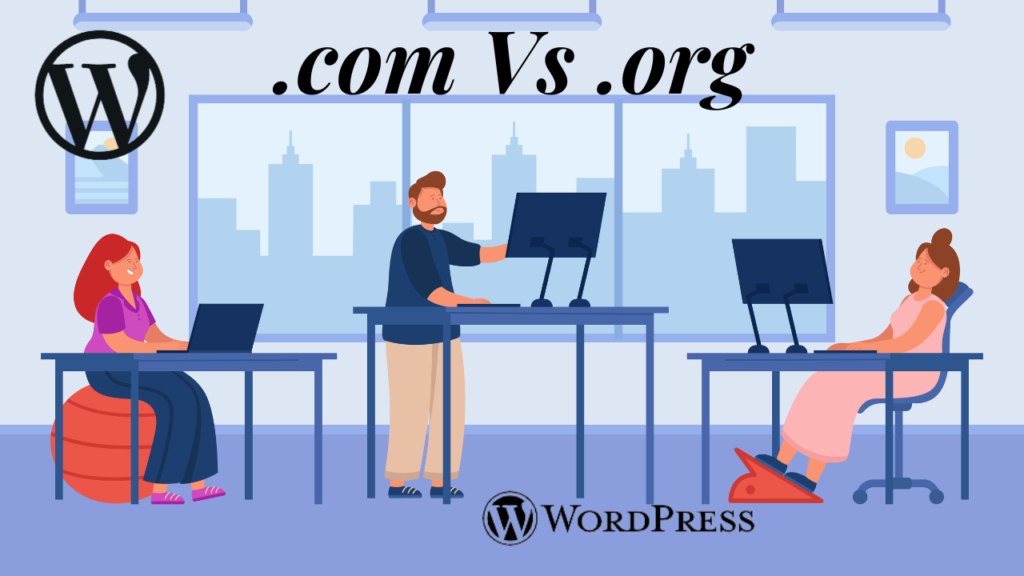WordPress.com vs WordPress.org – A Comprehensive Comparison
In the world of website creation and content management, WordPress has emerged as a prominent player, offering two distinct platforms: WordPress.com and WordPress.org. While both platforms share the same name and core functionality, they cater to different needs and preferences. In this article, we’ll dive deep into the differences between WordPress.com and WordPress.org, helping you make an informed decision based on your specific requirements.

Understanding the Difference
Before delving into the specifics, let’s clarify the fundamental distinction between WordPress.com and WordPress.org. WordPress.com is a hosted platform, meaning your website will reside on WordPress’s servers, while WordPress.org is a selfhosted platform, requiring you to manage your own hosting.
WordPress.com vs WordPress.org
WordPress.com: Pros and Cons
Pros
1. Ease of Use and Setup
Perfect for beginners with minimal technical knowledge.
Streamlined setup process, allowing you to get started quickly.
2. Managed Hosting and Security
Hosting and security aspects are taken care of by WordPress.com.
Regular updates and backups ensure a secure environment.
3. Diverse Pricing Plans
Range of plans available, from free to premium tiers.
Scalability options as your website grows.
Cons
1. Limited Customization
Restrictions on using custom themes and plugins, limiting design flexibility.
Unable to modify website code for advanced customization.
2. Branding and Monetization
WordPress.com ads on lowertier plans can impact the professional look of your site.
Limited monetization options on free and lowertier plans.
WordPress.org: Pros and Cons
Pros
1. Unparalleled Control and Customization
Complete freedom to customize themes, templates, and functionality.
Utilize an extensive library of thirdparty themes and plugins.
2. Monetization Opportunities
Explore various revenue streams such as ads, sponsored content, and ecommerce.
3. SEO and Performance Optimization
Implement SEO strategies using plugins and finetuned optimizations.
Utilize caching, image compression, and CDNs to enhance site performance.
Cons
1. Setup and Maintenance Responsibility
Requires selecting a hosting provider, installing WordPress, and managing updates.
Inexperienced users might face challenges during setup.
2. Security Concerns
Responsibility for ensuring website security, including implementing security plugins and measures.
Choosing the Right Platform
Factors to Consider
1. Website’s Purpose and Goals
Identify if you need a personal blog, business site, or online store.
2. Level of Customization
Evaluate the extent of design and layout control you require.
3. Budget and Cost Implications
Compare the costs of hosting, domains, and additional features.
4. Technical Proficiency
Assess your familiarity with website setup, maintenance, and troubleshooting.
5. Scalability and Future Growth
Consider whether your website might need to expand in the future.
Exploring WordPress.com in Depth
Features and Functionality
1. Predesigned Themes
Choose from a range of themes, suitable for different niches.
Quick customization options to align with your brand.
2. Builtin Features
Social sharing buttons, comment sections, and basic SEO tools.
Ecommerce options available on premium plans.
Deep Dive into WordPress.org
Setting Up
1. Domain and Hosting
Select a domain name and choose a hosting provider.
Install WordPress using your chosen hosting control panel.
2. Themes and Plugins
Explore the WordPress theme repository for a vast collection of themes.
Enhance functionality with plugins: SEO, security, performance, and more.
3. Customization and Development
Modify themes using builtin customization options or by editing CSS/HTML.
Hire developers for advanced customizations if needed.
4. SEO and Performance Optimization
Install SEO plugins and follow best practices for onpage optimization.
Optimize site performance using various techniques.
In the WordPress.com vs WordPress.org debate, the choice ultimately depends on your goals, technical expertise, and budget. WordPress.com suits beginners seeking an easy setup, while WordPress.org offers full control and limitless customization for those willing to invest time and effort. Assess your needs, weigh the pros and cons, and pick the platform that aligns with your vision for your online presence.
FAQs (Frequently Asked Questions)
1. Can I switch from WordPress.com to WordPress.org?
Yes, it’s possible to migrate your content, but some manual adjustments may be needed.
2. Do I need coding skills for using WordPress.org?
Basic HTML/CSS knowledge is helpful, but there are userfriendly options available.
3. Can I run ads on a WordPress.com site?
Ads are allowed on highertier plans, but free and lowertier plans might display WordPress.com ads.
4. Which platform is better for SEO?
WordPress.org offers more flexibility for implementing SEO strategies, but both platforms can be optimized.
5. Is WordPress.org more secure than WordPress.com?
Security largely depends on your actions; WordPress.org provides control but also requires diligent security measures.
Other Resources:
- Propeller Ads – Popular Online Advertising and Monetization.
- SEO – Your Pathway to Online Success.
- Unleashing the Power of SEMrush (A Comprehensive Guide).
- How to Use Pinterest for Blogging.
- Hostinger Review in 2023.
- SiteGround Review in 2023.
- The Best Blog Writing Tools.
- How to Make Your Blog Posts Go Viral.
- How to Get Your Blog Up and Running in 7 Easy Steps.
- How To Make Money with Affiliate Marketing for Beginners in 2023.
- 5 Practical Things To Do After Starting A Blog.
- Social Media Promotion.
- Pick A Profitable Niche In 5 Minutes.
- Best Niches for Affiliate Marketing in 2023.
- 10 Tips for Creating Engaging Blog Posts.


